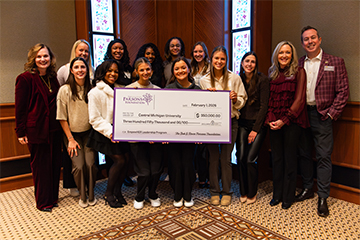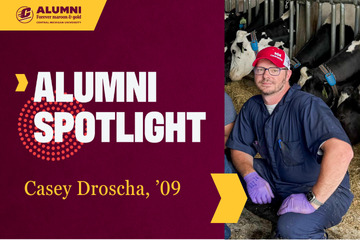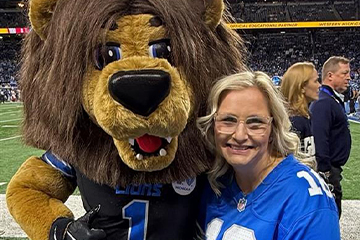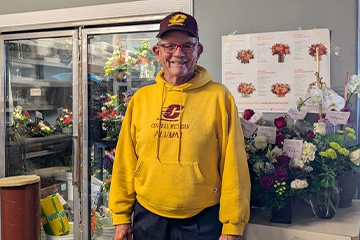From clinical student to speech-language pathology expert
Speech-language pathologist Bailey Blaisdell's impact extends far beyond Michigan
Bailey Blaisdell, 26, is a full-time speech-language pathologist at the University Center for Language and Literacy at the University of Michigan. This clinic includes an intensive, comprehensive aphasia program, and language and literacy services with the pediatric population. She spends much of her time working with individuals from all over the country in the intensive program, which provides approximately 25 hours a week of individual and group therapy. She also sees outpatient therapy clients for virtual and in-person services.
Initially, Bailey struggled to find her major. She started her education pursuing nursing at another academic institution, then transferred to CMU to focus on education. It wasn’t until she enrolled in CSD 130 “Normal Speech and Language Acquisition” that she learned about the speech-language pathology profession, and her direction to her professional career became clear. Bailey reported, “It felt like a great merging of some of the principles I enjoyed from my previous majors. I would be able to specialize and teach across the lifespan if I wanted to.”
During her time at CMU in her undergraduate and graduate course work, Bailey gained invaluable experiences with aphasia and acquired disorders through Dr. Katie Strong’s research community, the Strong Story Lab. Bailey’s experience in the lab ranged from research assistant, team member, and clinical partnership. It was in Dr. Strong’s lab where Bailey was introduced to the life-participation approach—a method she uses daily in her current work. Bailey feels the life-participation approach to aphasia (LPAA) is the best approach to therapy as it encompasses teamwork with the clients and their support system. LPAA is collaborative, meaningful, functional, and Bailey uses this approach to facilitate social connections among people with aphasia, whether that be with friends, family, community members, or other people with aphasia. Building partnerships with the clients the way that Bailey was mentored to do in therapy has helped her start the therapy process and continue to build the patient/client relationship throughout treatment. Bailey attributes her success in her professional career to being in Dr. Strong’s research lab and clinical team, as it allowed her to plan clinical sessions, lead activities, write notes, participate in collaborative meetings, and begin her clinical education sooner.
In addition to being a member of the Strong Story Lab, having hands-on faculty like Dr. Strong throughout her undergrad and graduate program was a real testament—the main reason Bailey chose CMU! She stated, “My number one reason for wanting to attend CMU was the professors. I was able to interact with many of the professors [during undergrad] and that continued into graduate school. I felt that they genuinely cared about not only my learning, but my growth as a person and clinician.” Given the wide range of expertise of faculty in Communication Sciences and Disorders, Bailey received a well-rounded education and experiences, which allowed her to find the population she wanted to work with and improve the quality of life to the many clients she works with.
The work Bailey does is meaningful because she ensures the therapy she provides is collaborative and personalized. As a result, she gets to know her clients on a more personal level which has a positive impact on their therapy. Bailey is now licensed in Michigan, Florida, and pending in California. Her skills and impact are far beyond Michigan borders in just over a year from her graduation in 2022 from Central Michigan University’s Speech-Language Pathology program.




